

Wat is MVO? Maatschappelijk verantwoord ondernemen (MVO) is ondernemen met oog voor uw bedrijf én uw omgeving.
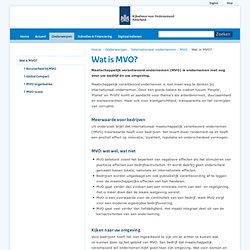
Maatschappelijk verantwoord ondernemen is niet meer weg te denken bij internationaal ondernemen. Door een goede balans te zoeken tussen 'People', 'Planet' en 'Profit' komt er aandacht voor thema's als arbeidsnormen, duurzaamheid en mensenrechten. Maar ook voor klantgerichtheid, transparantie en het vermijden van corruptie. Meerwaarde voor bedrijven Uit onderzoek blijkt dat internationaal maatschappelijk verantwoord ondernemen (IMVO) meerwaarde heeft voor bedrijven: het levert meer rendement op en heeft een positief effect op innovatie, loyaliteit, reputatie en onderscheidend vermogen. MVO: wat wel, wat niet MVO betekent zowel het beperken van negatieve effecten als het stimuleren van positieve effecten van bedrijfsactiviteiten.
Kijken naar uw omgeving Voor bedrijven hoeft het niet ingewikkeld te zijn om er achter te komen wat ze kunnen doen op het gebied van MVO. Consumenten? MVO-wegwijzer. Boek. What is Sustainability? Home » Who We Are » What is Sustainability?
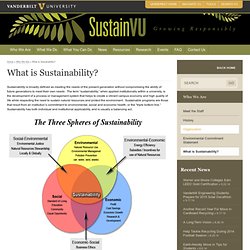
Sustainability is broadly defined as meeting the needs of the present generation without compromising the ability of future generations to meet their own needs . The term “sustainability,” when applied institutionally within a university, is the development of a process or management system that helps to create a vibrant campus economy and high quality of life while respecting the need to sustain natural resources and protect the environment .
Sustainable programs are those that result from an institution’s commitment to environmental, social and economic health, or the “triple bottom line.” Sustainability has both individual and institutional applicability, and is usually a balancing act. Ecologically Sustainable Organizations: An Institutional Approach. Abstract Our main objective in this article is to join the growing group of “green” organization theorists by demonstrating the usefulness of institutional theory as an approach to ecologically sustainable organizations.
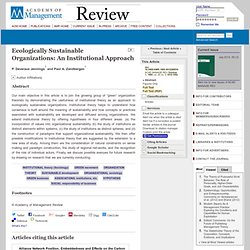
Institutional theory helps to understand how consensus is built around the meaning of sustainability and how concepts or practices associated with sustainability are developed and diffused among organizations. We extend institutional theory by offering hypotheses in four different areas: (a) the incorporation of values into organizational sustainability. (b) the study of institutions as distinct elements within systems, (c) the study of institutions as distinct spheres, and (d) the construction of paradigms that support organizational sustainability. We then offer possible modifications to institutional theory that are suggested by the extension to a new area of study. . © Academy of Management Review. Computing for Sustainability.
New (Dec 2011): “Sustainable Lens: A visual guide” published by NewSplash available through Amazon.
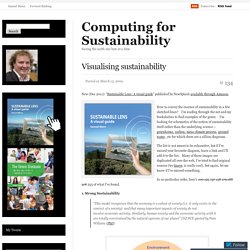
How to convey the essence of sustainability in a few sketched lines? I’m wading through the net and my bookshelves to find examples of the genre. I’m looking for schematics of the notion of sustainability itself rather than the underlying science – greenhouse, carbon, meso climate process, ground water, etc for which there are a zillion diagrams. The list is not meant to be exhaustive, but if I’ve missed your favourite diagram, leave a link and I’ll add it to the list. Many of these images are duplicated all over the web, I’ve tried to find original sources (try tineye, is really cool), but again, let me know if I’ve missed something.
Sustainable development. While the modern concept of sustainable development is derived mostly from the 1987 Brundtland Report, it is also rooted in earlier ideas about sustainable forest management and twentieth century environmental concerns.
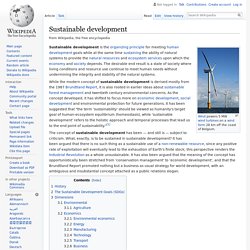
As the concept developed, it has shifted to focus more on economic development, social development and environmental protection for future generations. It has been suggested that "the term 'sustainability' should be viewed as humanity's target goal of human-ecosystem equilibrium (homeostasis), while 'sustainable development' refers to the holistic approach and temporal processes that lead us to the end point of sustainability. "[1] The concept of sustainable development has been — and still is — subject to criticism. History[edit] Following the publication of Rachel Carson's Silent Spring in 1962, the developing environmental movement drew attention to the relationship between economic growth and development and environmental degradation. Dimensions[edit] Agriculture[edit]